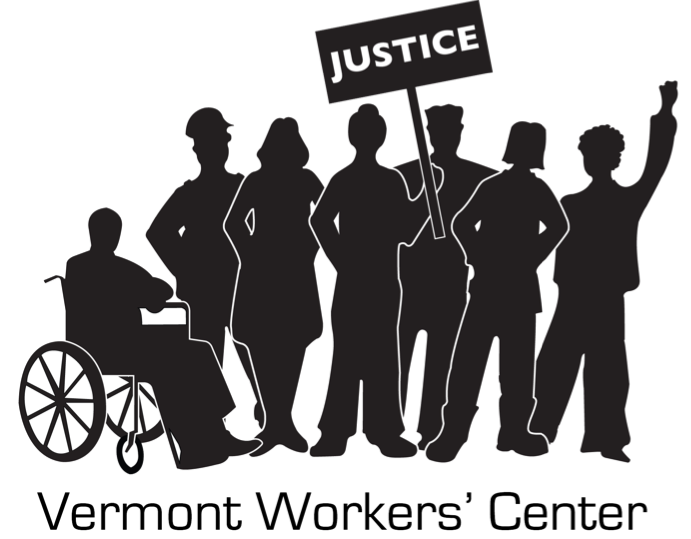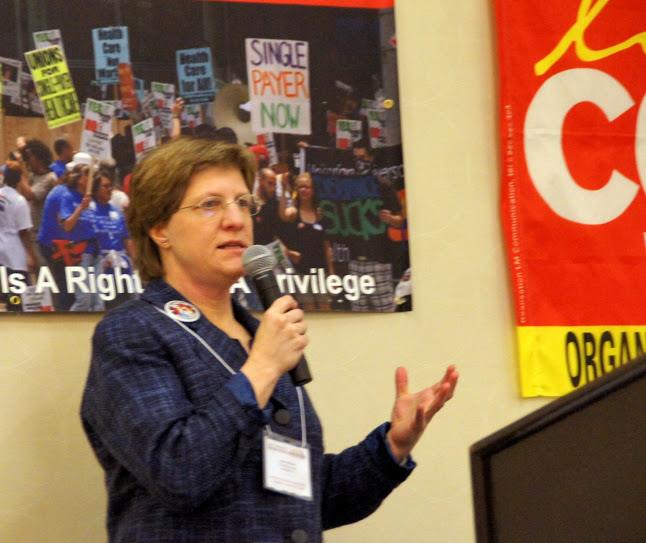This OpEd was published in VTDigger, the Brattleboro Reformer, Bennington Banner, Barre-Montpelier Times Argus, Mountain Times and Rutland Herald.
On August 12, the Green Mountain Care Board approved a 19.8% increase for BlueCross BlueShield premiums on Vermont Health Connect individual plans, along with a 22.8% increase for small group plans. This is the third year in a row with double-digit rate increases.
As a longtime member of the Vermont Workers’ Center, I’ve been helping to lead the “health care is a human right” campaign since 2008. In 2011, the Vermont Workers’ Center and our partners were instrumental in gaining passage of Vermont’s landmark universal health care law that remains in state statute, with its promise unfilled.
As a unionized state employee for 18 years (recently retired) I benefited from a mostly publicly funded, comprehensive health insurance program. Before landing a job with the state, though, I experienced the kinds of struggles to afford health care that I hear about when I speak with people around the state. I joined the Vermont Workers’ Center’s “health care is a human right” campaign because I know what it’s like to struggle to afford care, and because I feel a moral imperative to work to extend what state employees have — or better — to everyone in the state.
In the 10 years since the governor and legislature abandoned universal health care, Vermont’s health care crisis has grown exponentially worse. The costs for care and insurance premiums continue to skyrocket. Nine out of 14 hospitals in the state ended the last fiscal year in the red, with the threat of hospital bankruptcy closures imminent.
Close to 30,000 Vermonters were kicked off Medicaid from April to December of 2023, forcing many to buy into high-deductible, expensive, marketplace insurance plans. Many must simply go without health care or insurance because they can’t afford it. Everyone, from policy experts and consultants, to legislators, health care providers, and the average person seeking care, agrees the system is failing us. In the words of consultant Dr. Bruce Hamory, “the health care system in Vermont, unfortunately, is badly broken.”
While bold action is needed, meaningful political leadership is severely lacking. During this year’s legislative session, the House Health Care Committee advanced a significant and long-overdue proposal to substantially expand Medicaid, while increasing reimbursements to providers to ensure that hospitals and medical practices remain solvent. The bill was introduced with the support of 80 representatives and 14 senators.
Listening to testimony before the House health care committee last winter, I heard a wide range of constituencies voice their support for the concept, including representatives of the Scott administration, provider organizations and patient advocates. I listened to gut-wrenching stories from health care providers who can’t afford health care for themselves, or who worry about their ability to stay in practice and care for patients. I heard Vermonters speak about the stress of living with constant uncertainty about whether they will be able to remain on Medicaid, or afford increasing insurance costs, while working to support their families.
In the end, this effort to expand Medicaid was too ambitious for legislative leadership, who declined to include even a study of Medicaid expansion in the state budget. An updated study of the economics of publicly financed, universal health care was never on the table.
We are tired of the excuses for a lack of action that is long overdue. The excuse we hear repeatedly for why we cannot move forward with universal, publicly financed health care is that “we can’t afford it”.
Yet this week the Green Mountain Care Board approved double-digit increases in private health insurance premiums for the third year in a row. This is completely unaffordable for the vast majority of Vermonters, and unsustainable for our health care system. According to an analysis commissioned by the governor in 2014 (see Table 19), universal health care would actually have increased income for 93% of Vermont families, by shifting health care spending from private insurance premiums to tax-funded public financing, while controlling costs.
What does it mean to say “we can’t afford” universal health care? It means we willingly accept that Vermonters will be forced to delay care, suffer, and even die due to lack of access to health care. The refusal to act in the face of this crisis may seem abstract, but in fact, it amounts to policy violence that causes unnecessary suffering.
So many of us are affected by this health care crisis or are outraged by the moral failure of a system that rations health care according to ability to pay. Our collapsing health care system necessitates an all-hands-on-deck moment — we need a sustained effort of people impacted by this crisis to compel our elected government to respond to the will of the people.
On Monday, September 23rd, we’re holding a rally and poor people’s trial of the health care system on the steps of the Vermont Supreme Court. Join us at 12pm in Montpelier or tune in via Facebook or Instagram livestream to share your health care story — for more, visit the Workers’ Center website.
Leslie J. Matthews, PhD is a recently retired Environmental Scientist for the State of Vermont. She is co-chair of the Vermont Workers’ Center Campaign Team, and lives in Calais.

